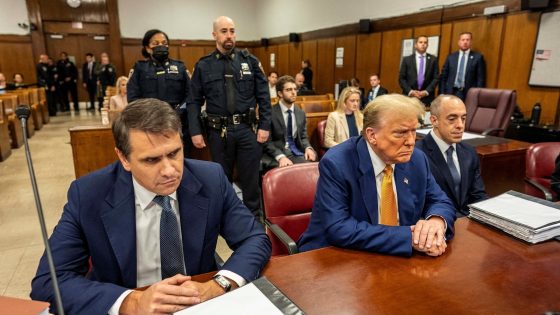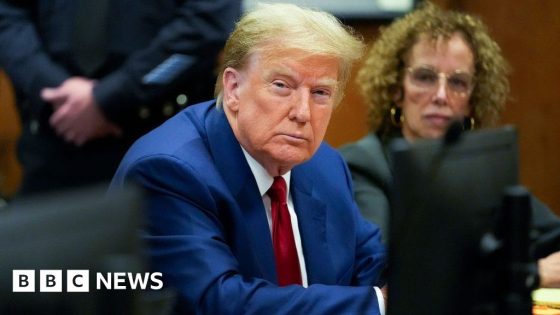Attorneys for Donald Trump in his criminal hush money trial on Thursday attempted to frame Keith Davidson, a Los Angeles-based attorney who represented Stormy Daniels and Karen McDougal, as an unsavory figure who made a career of extorting wealthy celebrities for shady clients.
Jurors also heard the voice of a man whose name has come up repeatedly in these proceedings: Trump’s former attorney, Michael Cohen. Both parties played audio recordings of phone conversations he surreptitiously recorded, including one in which Cohen said Donald Trump told him: “I hate the fact that we did it,” referring to the nondisclosure deal with Stormy Daniels.
Meanwhile, Judge Juan Merchan is yet again considering motions to hold Trump in criminal contempt for violating a gag order after prosecutors on Thursday accused him of making public statements about witnesses and the jury that are “corrosive to this proceeding.”
Trump is on trial for allegedly falsifying business records to hide the reimbursement of a hush money payment Cohen made to Daniels in order to boost his electoral prospects in the 2016 presidential election. The former president has denied all wrongdoing.
Here are the top takeaways from Day 10 of the proceedings.
Cohen said Trump told him ‘I hate’ that we paid off Daniels
Michael Cohen developed a practice of recording his phone conversations, and on Thursday, jurors heard some of them — including one that featured his former boss.
In one recording, introduced into evidence by prosecutors during Keith Davidson’s testimony, Cohen could be heard telling Davidson: “I can’t even tell you how many times he [Trump] said to me, ‘I hate the fact that we did it.'”
Davidson said Cohen was referring to Trump’s nondisclosure agreement with Stormy Daniels — an important piece of evidence that further suggests Trump had awareness of the transaction.
A custodial witness, Douglas Daus, testified about a September 2016 recording of Donald Trump discussing the arranged purchase of Karen McDougal’s story. This recording was made public in 2018.
Defense tries to paint Davidson as extortionist
Donald Trump’s legal team spent several hours cross-examining Davidson about his record of negotiating settlements with high-profile Hollywood figures — repeatedly invoking words like “extortion” and “leverage” to undermine his credibility and suggest a pattern of conduct.
Defense attorney Emil Bove and Davidson jousted for hours, each man growing frustrated at times as Bove ticked through a series of clients and negotiations Davidson brokered, including a settlement with Charlie Sheen, an alleged sex tape featuring Tila Tequila, and a TMZ leak about Lindsey Lohan.
“By 2016, you were pretty well-versed in getting right up to the line without committing extortion, right?” Bove asked.
Davidson stubbornly rebuffed those efforts, reluctant to cooperate with Bove’s yes-or-no-style questions and eager to filibuster, obfuscate, and claim not to recall basic details from his past.
Former President Donald Trump sits inside Manhattan Criminal Court room, in NYC, May 2, 2024.
Mark Peterson/Pool via Reuters
‘What have we done?’ Davidson asked
“What have we done?” Davidson texted National Enquirer editor Dylan Howard on election night 2016 as it became clear that Donald Trump had secured the presidency.
Davidson told the jury this was an attempt at “gallows humor,” but added, on a more serious note, that “there was an understanding that our activities may have in some way assisted the presidential campaign of Donald Trump.”
Davidson, on the stand, divulged behind-the-scenes details about brokering the hush payments, what happened as details of the arrangements emerged in the press, and his efforts to protect Stormy Daniels from Michael Cohen’s “legal threats” as she underwent a change of heart.
In early 2018, as Daniels prepared to appear on Jimmy Kimmel, Davidson said he penned a statement on her behalf in the Marilyn Monroe suite at the iconic Roosevelt Hotel in Hollywood, denying an affair with Trump.
Hours later, on national television, Daniels suggested the statement was not true, prompting Cohen to make repeated threats to sue.
Judge weighs additional gag order violations
Judge Juan Merchan withheld ruling on four additional contempt motions filed by prosecutors, who accused Trump of violating the court-imposed limited gag order by making public statements about the impartiality of the jury and several witnesses in the case.
Trump attorney Todd Blanche argued that his client was entitled to respond to “repeated attacks on President Trump’s campaign for president” — saying that “part of the campaign takes place outside of this courtroom.”
But Merchan pushed back, reminding Blanche that “nobody forced your client” to go talk to cameras outside the courthouse.
Later in the day, Susan Necheles, another attorney for Trump, handed the judge a series of articles “which President Trump would like to post on his Truth [Social account],” Necheles said.
“We think they are perfectly fine, but we think there is ambiguity in the gag order,” she said, asking the judge to “take a look at them” before Trump posted them.
Merchan did not seem inclined to take up the matter, telling Necheles, “There is no ambiguity in the order.”
“I am not going to give an advanced ruling on this,” Merchan said. “When in doubt, steer clear.”
Source Agencies



